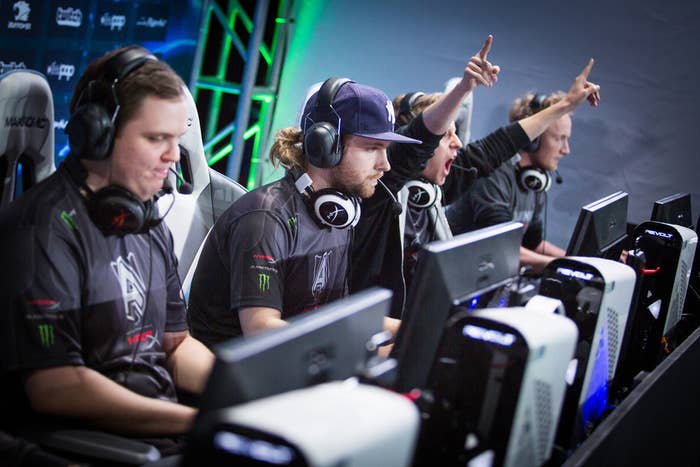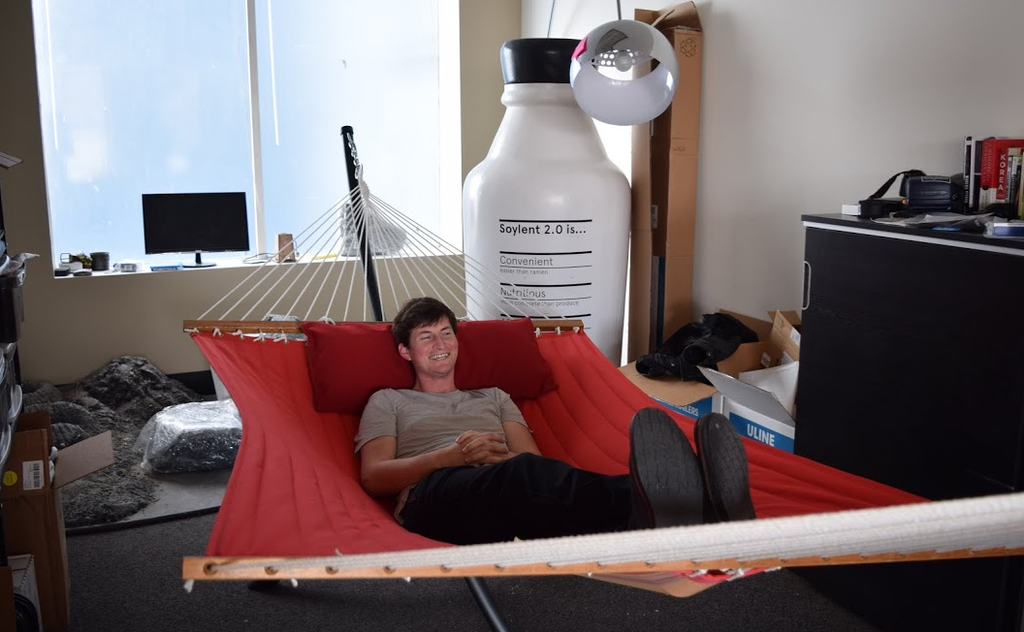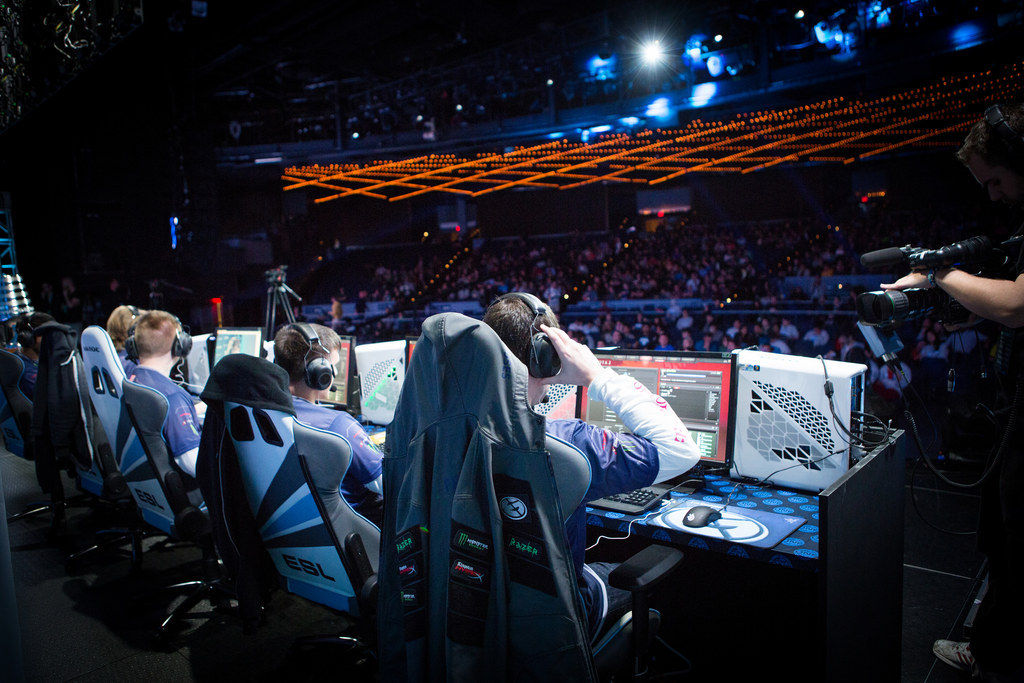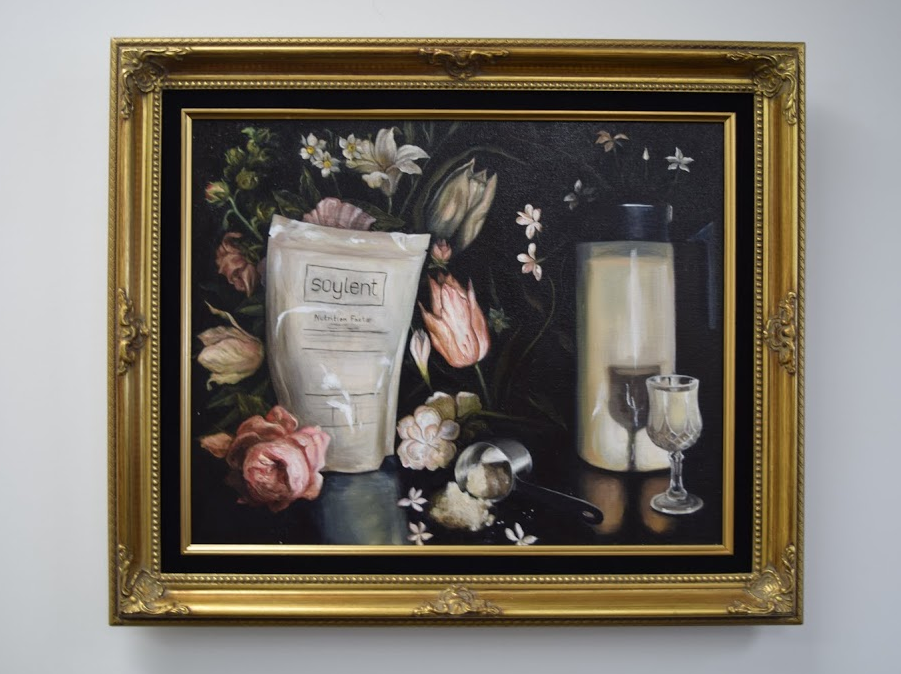
This weekend, as thousands of fans descend on Madison Square Garden to watch professional video gamers duke it out with spells and blades, they'll encounter a startup executive in a space suit. He'll offer them sample-size cups of a thick, white fluid that, he hopes, will one day replace their lunch.
This would-be future food, Soylent, is a bland-tasting blend of carbohydrates, protein, vitamins, and other nutrients that has been around for about two years now, gaining devotees among techies who don't have the time or the desire to eat food.
Big-name investors have put millions into the Los Angeles–based company. But Soylent, the brainchild of a 27-year-old software engineer named Rob Rhinehart, remains a little too weird even for many of the white-collar geeks it wants to reach. Now, the company is betting that major league video gaming, or e-sports — a global industry with a fast-growing and passionate fan base — will be its ticket to more widespread adoption.
In September, Soylent signed a sponsorship deal with the Electronic Sports League, which runs events including ESL One, the tournament being held this weekend in New York. The deal represents the biggest item in Soylent's marketing budget this year, with the company paying between $100,000 and $300,000 — executives wouldn't get more specific than that — to sponsor ESL One. Soylent will have its logo plastered over the event and the online broadcasts beaming the fantasy battle arena game Dota 2 to millions of fans. Soylent has also agreed to sponsor an upcoming pro season of the popular first-person shooter Counter-Strike: Global Offensive.
Soylent was inspired by a recent visit to the Santa Monica campus of Red Bull, the energy drink maker whose original films and athlete sponsorships have made it synonymous with extreme sports. Soylent hopes to become a major patron of feats of computerized daring, and has considered sponsoring an e-sports team, executives told BuzzFeed News. Once it completes an office expansion, the executives said, Soylent wants to invite professional video gamers to train in a special gaming room, which, of course, will include plenty of free Soylent. In its own small, quirky way, this food-hacking startup with a name from science fiction wants to be the Red Bull of competitive video gaming.
"I kind of like basketball, and I watched my college football team, but I was never that really into traditional sports," Rhinehart said in a conference room in Soylent's downtown L.A. office, where workers were renovating the upper floor. "And I think it's really cool that e-sports are taking off, because, like, I always loved chess — having a really strong mental, strategic aspect to a game."
There's an undeniable logic to Soylent getting into bed with the nerd version of the NFL. All-night hackathons and marathon LAN parties are often littered with boxes of pizza or other junk food; Soylent's pitch is to replace an unhealthy convenience with a healthier one. More fundamentally, Soylent thinks gamers will be receptive to its geeky, science-heavy ethos. In the guarded phrasing of David Renteln, a Soylent co-founder and its chief marketing officer, "the demographic is very much a demographic that is interested in scientific concepts."
From the beginning, Soylent encouraged its fans to tinker with the recipe, which it published online. The company now plays up the idea of environmental sustainability, noting that a portion of the ingredients in its 2.0 line comes from algae rather than farms. Rhinehart, who announced Soylent to the world in a blog post called "How I Stopped Eating Food," chronicling a 30-day stretch of surviving only on his pasty brew, likes to use his own body as a science lab. After challenging himself to temporarily cut down on his water use, he wrote in a blog post last year, he consumed 500 milligrams of the antibiotic Rifaximin, which "massacred my gut bacteria" and, he claimed, made him stop pooping. ("Soylent's microbiome consultant advised that this is a terrible idea so I do not recommend it.")
Rhinehart's weird habits have made him into something of a nerd folk hero. He doesn't do laundry, for example. Instead, he kills microbes in his clothing with a UV Sterilizer, a process he repeats a few times before donating the shirts and underwear and buying new ones. "If I was doing a full load of wash it would be more efficient, but since I have very little clothing and would only be washing a few pieces at a time it actually is more energy and water efficient to have new ones manufactured," he told BuzzFeed News in an email. He also has a pet pig.
And, of course, Rhinehart is into video games. Soylent employees regularly blow off steam by playing games like Counter-Strike in the office gaming room. Rhinehart used to play StarCraft and dabbles in League of Legends. About a month ago, he took a nasty spill while riding a hoverboard around the office — the two-wheeled kind, favored by Wiz Khalifa — and broke his ankle. "I botched the dismount," he said. With a medical boot on his foot, he posted up for a while in a hammock in the office, near an oversize bottle of Soylent 2.0.
"I like the fact that in e-sports," Rhinehart said, "no one gets hurt."

Soylent is getting into the sponsorship business just as gaming becomes a mass-audience entertainment form on par with professional sports. Sites like YouTube and Twitch broadcast video gaming to a global audience, racking up hundreds of millions of views each month, and pro tournaments sell out big arenas and offer multimillion-dollar prize pools.
The business model of e-sports is also shifting to more closely resemble that of major sports. Most of the money in e-sports has come from games publishers looking to push their wares, but sponsorship — which starts to make sense when millions are watching — is becoming a bigger piece of the pie.
The traditional sponsors of e-sports have been companies that sell computers, mice, graphics cards, and other gaming equipment. More recently, big food and drink companies have joined them, and a few years ago, Monster Energy signed a deal with the North American gaming team Evil Geniuses. At last year's ESL One in New York, a major sponsor was Pizza Hut.
And Red Bull — not content to let someone else become the Red Bull of e-sports — is already a major player, sponsoring tournaments and hosting e-sports athletes at a studio in its office. (Red Bull also runs training programs for e-sports stars, including weeklong camps where they can learn to perform well under pressure.)
Now Soylent, a scrappy newcomer, is stepping into the arena. The Soylent spaceman will greet fans in an entrance hallway at the Madison Square Garden theater this weekend, before they head inside to see the Soylent logo in big letters by the stage. The commentators will give shout-outs to Soylent. A 60-second Soylent ad will run on the broadcast.

In the future, Soylent wants to build "facilities for gamers to come practice and work on their game," said Renteln, the chief marketing officer. The company also wants to build a film studio to create its own ads, according to Julio Miles, the startup's creative director. The ads might focus on the product, or possibly even be Red Bull-style videos featuring e-sports players.
The big unknown is whether Soylent will catch on among e-sports fans.
"The community aspect is so incredibly strong that if you just slap any brand on there, any product, they might lash out and be unhappy with it," Jesse Sell, who handles sponsorships at ESL, told BuzzFeed News. "It's just this kind of mob mentality. They're very, very into what they're into."
Sell said he was confident Soylent would be a fit.
While professional video gamers follow training regimens and watch what they eat, casual fans tend not to care as much about food. Still, Soylent is appealing to gamers' minds over their stomachs. "You wouldn't treat your laptop — like, you wouldn't leave a slice of pizza on it. And you wouldn't treat your body in the same way," Miles said. Soylent, he said, "definitely will power you a lot more efficiently than eating half a Little Caesars Hot-N-Ready pizza before you go play."
The talks with ESL began when Conor Parker, Soylent's community manager, who formerly was a competitive gamer and professional commentator, reached out to a friend at the e-sports league. Parker, part of the e-sports world back in its DIY days a decade ago, said the gaming diet is ready for an overhaul.
"You go to these events, you'll see Dr. Pepper, you'll see Mountain Dew. You just don't see anything healthy, really," Parker said. "So this is a nice option for gamers. I feel like it'll be good for them to really change their diets around."

